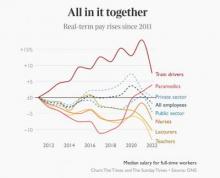Marking and Assessment Boycott in Higher Education keeps pressure on employers
The Solidarity Federation Education Union (SFEU) would like to express its heartfelt thanks for the support shown by students at recent graduation ceremonies. The Marking and Assessment Boycott (MAB) has been a difficult time for both staff and students, but it is clear that we stand in solidarity together against those institutions that would rather penalise its workers than negotiate with them. At some institutions, the MAB has had such a huge impact that graduation and classification of degrees has been severely affected. These huge sacrifices in terms of both pay and of grades demonstrate that that together we can make a difference and cracks are starting to show in the employers' association (UCEA), with one university, Queen's University Belfast, being suspended from UCEA for breaking ranks and brokering a local agreement.









